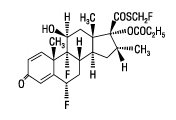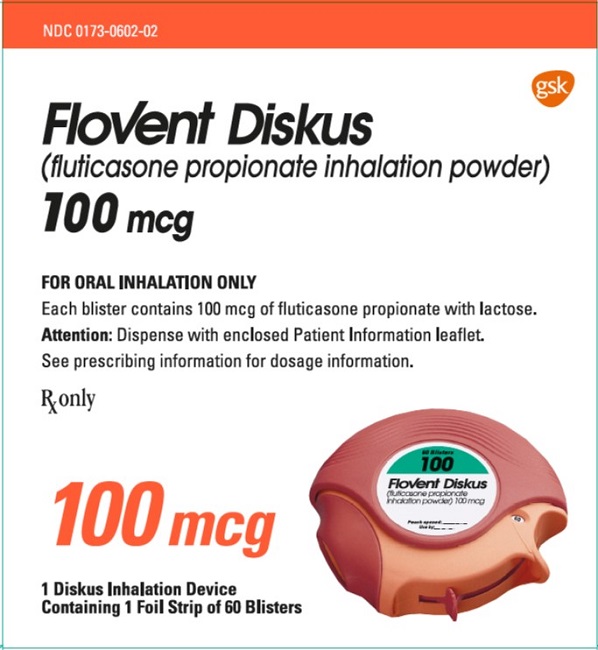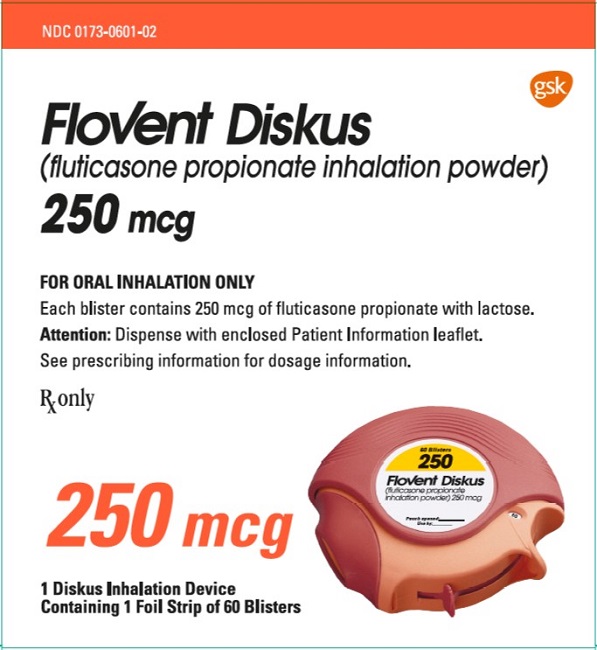Flovent Diskus
Generic name: fluticasone inhalation
Brand names: Arnuity Ellipta, Flovent Diskus, Flovent HFA
Drug class: Inhaled corticosteroids
Medically reviewed by A Ras MD.
What is Flovent Diskus?
Flovent Diskus is a prescription inhaled corticosteroid (ICS) medicine used for the long-term treatment of asthma in people aged 4 years and older.
ICS medicines such as fluticasone propionate help to decrease inflammation in the lungs. Inflammation in the lungs can lead to breathing problems. Flovent Diskus is not used to relieve sudden breathing problems and will not replace a rescue inhaler. It is not known if Flovent Diskus is safe and effective in children younger than 4 years of age.
Description
FLOVENT DISKUS inhalation powder is a dry powder inhaler for oral inhalation. The active component of FLOVENT DISKUS 50 mcg, FLOVENT DISKUS 100 mcg, and FLOVENT DISKUS 250 mcg is fluticasone propionate, a corticosteroid having the chemical name S-(fluoromethyl) 6α,9-difluoro-11β,17-dihydroxy-16α-methyl-3-oxoandrosta-1,4-diene-17β-carbothioate, 17-propionate and the following chemical structure:

Fluticasone propionate is a white powder with a molecular weight of 500.6, and the empirical formula is C25H31F3O5S. It is practically insoluble in water, freely soluble in dimethyl sulfoxide and dimethylformamide, and slightly soluble in methanol and 95% ethanol.
FLOVENT DISKUS is an orange plastic inhaler containing a foil blister strip. Each blister on the strip contains a white powder mix of micronized fluticasone propionate (50, 100, or 250 mcg) in 12.5 mg of formulation containing lactose monohydrate (which contains milk proteins). After the inhaler is activated, the powder is dispersed into the airstream created by the patient inhaling through the mouthpiece.
Under standardized in vitro test conditions, FLOVENT DISKUS delivers 46, 94, and 229 mcg of fluticasone propionate from FLOVENT DISKUS 50 mcg, FLOVENT DISKUS 100 mcg, and FLOVENT DISKUS 250 mcg, respectively, when tested at a flow rate of 60 L/min for 2 seconds.
In adult subjects with obstructive lung disease and severely compromised lung function (mean FEV1 20% to 30% of predicted), mean peak inspiratory flow (PIF) through the DISKUS inhaler was 82.4 L/min (range: 46.1 to 115.3 L/min). In children with asthma aged 4 and 8 years, mean PIF through FLOVENT DISKUS was 70 and 104 L/min, respectively (range: 48 to 123 L/min).
The actual amount of drug delivered to the lung will depend on patient factors, such as inspiratory flow profile.
Mechanism of Action
Fluticasone propionate is a synthetic trifluorinated corticosteroid with anti-inflammatory activity. Fluticasone propionate has been shown in vitro to exhibit a binding affinity for the human glucocorticoid receptor that is 18 times that of dexamethasone, almost twice that of beclomethasone-17-monopropionate (BMP), the active metabolite of beclomethasone dipropionate, and over 3 times that of budesonide. Data from the McKenzie vasoconstrictor assay in man are consistent with these results. The clinical significance of these findings is unknown.
Inflammation is an important component in the pathogenesis of asthma. Corticosteroids have been shown to have a wide range of actions on multiple cell types (e.g., mast cells, eosinophils, neutrophils, macrophages, lymphocytes) and mediators (e.g., histamine, eicosanoids, leukotrienes, cytokines) involved in inflammation. These anti-inflammatory actions of corticosteroids contribute to their efficacy in asthma.
Though effective for the treatment of asthma, corticosteroids do not affect asthma symptoms immediately. Individual patients will experience a variable time to onset and degree of symptom relief. Maximum benefit may not be achieved for 1 to 2 weeks or longer after starting treatment. When corticosteroids are discontinued, asthma stability may persist for several days or longer.
Trials in subjects with asthma have shown a favorable ratio between topical anti-inflammatory activity and systemic corticosteroid effects with recommended doses of orally inhaled fluticasone propionate. This is explained by a combination of a relatively high local anti-inflammatory effect, negligible oral systemic bioavailability (<1%), and the minimal pharmacological activity of the only metabolite detected in man.
Who should not use Flovent Diskus?
Do not use Flovent Diskus:
- to relieve sudden breathing problems.
- as a rescue inhaler.
- if you have a severe allergy to milk proteins. Ask your healthcare provider if you are not sure.
- if you are allergic to fluticasone propionate.
What should I tell my healthcare provider before using Flovent Diskus?
Before using Flovent Diskus, tell your healthcare provider about all of your medical conditions, including if you:
- have liver problems.
- have weak bones (osteoporosis).
- have an immune system problem.
- have or have had eye problems, such as glaucoma, increased pressure in your eye, cataracts, or other changes in vision.
- are allergic to milk proteins.
- have any type of viral, bacterial, or fungal infection.
- are exposed to chickenpox or measles.
- are pregnant or plan to become pregnant. It is not known if Flovent Diskus may harm your unborn baby.
- are breastfeeding. It is not known if the medicine in Flovent Diskus passes into your milk and if it can harm your baby.
Tell your healthcare provider about all the medicines you take, including prescription and over-the-counter medicines, vitamins, and herbal supplements. Flovent Diskus and certain other medicines may interact with each other. This may cause serious side effects. Especially tell your healthcare provider if you take antifungal or anti-HIV medicines.
Know the medicines you take. Keep a list of them to show your healthcare provider and pharmacist when you get a new medicine.
How should I use Flovent Diskus?
Read the step-by-step instructions for using Flovent Diskus that comes with Flovent Diskus.
- Do not use Flovent Diskus unless your healthcare provider has taught you how to use the inhaler and you understand how to use it correctly.
- Children should use Flovent Diskus with an adult’s help, as instructed by the child’s healthcare provider.
- Flovent Diskus comes in 3 different strengths. Your healthcare provider prescribed the strength that is best for you.
- Use Flovent Diskus exactly as your healthcare provider tells you to use it. Do not use Flovent Diskus more often than prescribed.
- It may take 1 to 2 weeks or longer after you start Flovent Diskus for your asthma symptoms to get better. You must use Flovent Diskus regularly.
- Do not stop using Flovent Diskus, even if you are feeling better, unless your healthcare provider tells you to.
- If you miss a dose of Flovent Diskus, just skip that dose. Take your next dose at your usual time. Do not take 2 doses at 1 time.
- Flovent Diskus does not relieve sudden breathing problems. Always have a rescue inhaler with you to treat sudden symptoms. If you do not have a rescue inhaler, call your healthcare provider to have one prescribed for you.
- Rinse your mouth with water without swallowing after each dose of Flovent Diskus. This will help lessen the chance of getting a yeast infection (thrush) in your mouth and throat.
- Call your healthcare provider or get medical care right away if:
- your breathing problems get worse.
- you need to use your rescue inhaler more often than usual.
- your rescue inhaler does not work as well to relieve your symptoms.
- you need to use 4 or more inhalations of your rescue inhaler in 24 hours for 2 or more days in a row.
- you use 1 whole canister of your rescue inhaler in 8 weeks.
- your peak flow meter results decrease. Your healthcare provider will tell you the numbers that are right for you.
What are the possible side effects of Flovent Diskus?
Flovent Diskus can cause serious side effects, including:
- fungal infection in your mouth or throat (thrush). Rinse your mouth with water without swallowing after using Flovent Diskus to help reduce your chance of getting thrush.
- weakened immune system and increased chance of getting infections (immunosuppression).
- reduced adrenal function (adrenal insufficiency). Adrenal insufficiency is a condition where the adrenal glands do not make enough steroid hormones. This can happen when you stop taking oral corticosteroid medicines (such as prednisone) and start taking a medicine containing an inhaled steroid (such as Flovent Diskus). During this transition period, when your body is under stress such as from fever, trauma (such as a car accident), infection, or surgery, adrenal insufficiency can get worse and may cause death.
Symptoms of adrenal insufficiency include: - serious allergic reactions. Call your healthcare provider or get emergency medical care if you get any of the following symptoms of a serious allergic reaction:
- rash
- swelling of your face, mouth and tongue
- hives
- breathing problems
- bone thinning or weakness (osteoporosis).
- slowed growth in children. Your child’s growth should be checked regularly by the healthcare provider while using Flovent Diskus.
- eye problems including glaucoma, increased pressure in your eye, cataracts, or other changes in vision. You should have regular eye exams while using Flovent Diskus.
- increased wheezing (bronchospasm). Increased wheezing can happen right away after using Flovent Diskus. Always have a rescue inhaler with you to treat sudden wheezing.
Common side effects of Flovent Diskus include:
- upper respiratory tract infection
- fever
- nose irritation
- throat irritation
- headache
- upset stomach
- nausea and vomiting
- sinus irritation
- persistent cough
- cough
These are not all the possible side effects of Flovent Diskus.
Call your doctor for medical advice about side effects. You may report side effects to FDA at 1-800-FDA-1088.
General information about the safe and effective use of Flovent Diskus
Medicines are sometimes prescribed for purposes other than those listed in a Patient Information leaflet. Do not use Flovent Diskus for a condition for which it was not prescribed. Do not give Flovent Diskus to other people, even if they have the same symptoms that you have. It may harm them.
You can ask your healthcare provider or pharmacist for information about Flovent Diskus that is written for health professionals.
How should I store Flovent Diskus
- Store Flovent Diskus at room temperature between 68°F and 77°F (20°C and 25°C). Keep in a dry place away from heat and sunlight.
- Store Flovent Diskus in the unopened foil pouch and only open when ready for use.
- Safely throw away Flovent Diskus 50 mcg in the trash 6 weeks after you open the foil pouch or when the counter reads 0, whichever comes first.
- Safely throw away Flovent Diskus 100 mcg and Flovent Diskus 250 mcg in the trash 2 months after you open the foil pouch or when the counter reads 0, whichever comes first.
Keep Flovent Diskus and all medicines out of the reach of children.
What are the ingredients in Flovent Diskus?
Active ingredient: fluticasone propionate
Inactive ingredient: lactose monohydrate (contains milk proteins)
Label
PRINCIPAL DISPLAY PANEL
- NDC 0173-0602-02
- Flovent Diskus
- (fluticasone propionate inhalation powder)
- 100 mcg
- FOR ORAL INHALATION ONLY
- Each blister contains 100 mcg of fluticasone propionate with lactose.
- Attention: Dispense with enclosed Patient Information leaflet.
- See prescribing information for dosage information.
- Rx only
- 100 mcg
- 1 Diskus Inhalation Device Containing 1 Foil Strip of 60 Blisters
- ©2020 GSK group of companies or its licensor.
- Made in Singapore
- 62000000049316 Rev. 04/20
-

PRINCIPAL DISPLAY PANEL
- NDC 0173-0601-02
- Flovent Diskus
- (fluticasone propionate inhalation powder)
- 250 mcg
- FOR ORAL INHALATION ONLY
- Each blister contains 250 mcg of fluticasone propionate with lactose.
- Attention: Dispense with enclosed Patient Information leaflet.
- See prescribing information for dosage information.
- Rx only
- 250 mcg
- 1 Diskus Inhalation Device Containing 1 Foil Strip of 60 Blisters
- ©2020 GSK group of companies or its licensor.
- Made in Singapore
- 62000000049317 Rev. 04/20
-

SRC: NLM .
